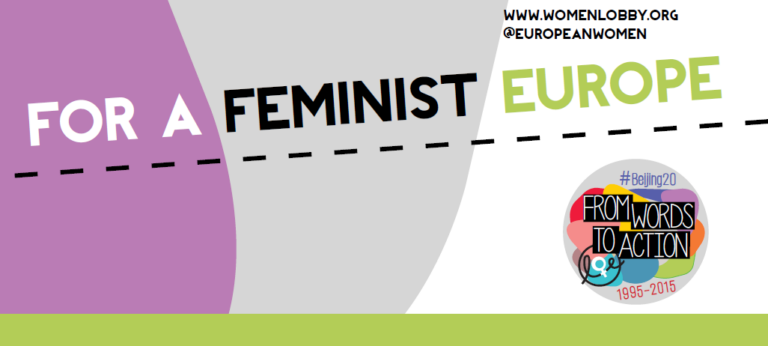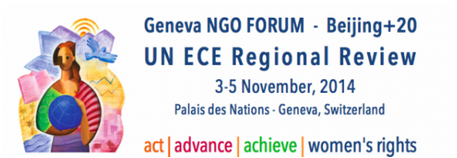[New York, 24 February 2011] The European Women’s Lobby is currently actively contributing to the debate on the draft conclusions of the UN 2011 Commission on the Status of Women conclusions. Please find below the EWL amendments to the conclusions on “Access and participation of women and girls to education, training, science and technology, including for the promotion of women’s equal access to full employment and decent work”.
Draft presented by: Bureau of the Commission on the Status of Women, 11 February 2011.
Commission on the Status of Women: 55th session – 22 February to 4 March 2011.
Access and participation of women and girls to education, training, science and technology, including for the promotion of women’s equal access to full employment and decent work:
- The Commission on the Status of Women reaffirms the Beijing Declaration and Platform for Action, the outcome documents of the twenty-third special session of the General Assembly, and the declarations adopted by the Commission on the occasion of the tenth and fifteenth anniversary of the Fourth World Conference on Women. (Based on CSW52 agreed conclusions, paras. 1 and 2; CSW53 agreed conclusions, para. 1)
- The Commission recalls the Budapest Science Agenda – Framework for Action adopted at the World Conference on Science, the Dakar Framework for Action adopted at the World Education Forum, and the United Nations Millennium Declaration.
- The Commission reiterates that the Convention on the Elimination of All Forms of Discrimination against Women, and its Optional Protocol, as well as relevant conventions of the International Labour Organization, provide a legal framework for the promotion of gender equality in education and employment. (Based on CSW53 agreed conclusions, paras. 3 and 5)
- The Commission stresses that education and training is a human right and an essential tool for the empowerment of women, including their economic empowerment. EWL amendment, add: The Commission stresses that gender sensitive education and training is also a tool that should be used for the promotion of human rights, women’s rights and equality between women and men. It welcomes the progress made in increasing women’s and girls’ access to and participation in education and training, including science and technology education. The Commission recognizes the potential of EWL amendment, add: formal as well as non-formal education and training, and of science and technology, to contribute to economic growth and accelerate progress towards achieving internationally agreed development goals, including the Millennium Development Goals by 2015.
- The Commission expresses concern that low quality of education reduces the benefits of education and training for women and girls, and that women’s educational gains are yet to translate into equal access to full employment, and decent work EWL amendment, add: and full equality in decision-making . It remains deeply concerned by EWL amendment, add: the unequal access to education, training and employment and the persistence of gender stereotypes, and the under-representation of girls and women in some sub-fields of science and technology education and employment, and of boys and men in care-related sectors. The Commission recognizes that science and technology research, development and deployment have insufficiently responded to women’s needs.
NEW
EWL amendment, add: The Commission stresses that certain groups of girls and young women are vulnerable to missing out on educational qualifications. Girls from low-income families and vulnerable groups, especially in rural areas are more likely to be low-skilled and difficulties in access to education lead to reinforcement of the traditional preference for education for boys.
NEW
EWL amendment, add: The Commission expresses concern about the potential effects of the crisis and of austerity measures on the availability and quality of education services, whereby girls may be the first to suffer from budgetary cuts in such services.
NEW
EWL amendment, add: The Commission acknowledges the important role of national machineries for the advancement of women, national human rights institutions where they exist, and civil society, especially women’s organizations, in advancing the implementation of the Beijing Declaration and Platform for Action as well as relevant conventions, and in promoting the equal sharing of responsibilities between women and men, and recognizes their contributions to the work of the Commission.
NEW
EWL amendment, add: The Commission expresses concern at the serious and persistent obstacles, which are many and varied in nature, that still hinders the advancement of women and girls including, inter alia, the persistent feminization of poverty; all forms of violence against women; unequal access to health, education, training and employment; armed conflict and natural disasters.
- The Commission urges Governments, the relevant entities of the United Nations system, international and regional organizations, and civil society, including educational, scientific research and scientific research funding institutions, the private sector, EWL amendment, add media, employer organizations, trade unions, professional bodies, and non-governmental organizations, to take the following actions:
Strengthening national policies and programmes
NEW
EWL amendment, add:.Promote an active and visible policy of mainstreaming a gender equality and women’s rights perspective into all education policies and programmes, addressing, inter alia, unequal access to educational opportunities and inadequate educational opportunities, and taking into account the needs of girls and women facing multiple discrimination, all forms of violence against women, poverty and social exclusion.
a) Improve the collection, compilation and dissemination of
EWL amendment, add: quantitative and qualitative sex- and age-disaggregated data
EWL amendment, add: and indicators on education, training and employment, particularly science and technology employment, to better inform policymaking; (based on E/CN.6/2011/3, paras. 29 and 66 (d); E/CN.6/2011/5, para. 65 (t))
b) Strengthen monitoring and evaluation of existing policies and programmes to promote gender equality in education and training, science and technology, and access to employment, so as to assess their effectiveness and impact and improve future policies and programmes; (based on E/CN.6/2011/3, para. 66 (a); E/CN.6/2011/5, para. 65 (a))
c) Increase public and private investment in education and training to expand
EWL amendment, add: and ensure women’s and girls’ access to quality education, and training
EWL amendment, add vocational training and lifelong learning , as well as in science and technology research and development that directly benefits women; (based on E/CN.6/2011/3, paras 52 and 63; E/CN.6/2011/5, paras. 15 and 28)
d) Expand the use of gender-responsive budgeting to ensure that public resources, particularly in science and technology research and development, benefit women and men equally and contribute to the empowerment of women; (based on E/CN.6/2011/3, para. 62; E/CN.6/2011/5, para. 65 (a)).
NEW
EWL amendment, add: Develop methods and tools to ensure that the different needs and social backgrounds of young women and girls are integrated when designing education and training programmes.
NEW
EWL amendment, add: Provide funding for the creation, development and support of gender and feminist studies and research.
NEW
EWL amendment, add: Set time-bound targets and/or quotas to achieve gender parity in decision-making positions in the educational sector.
NEW
EWL amendment, add: Recognize the potential of non-formal education to provide complementary teaching and training methods for girls and young women to access complex and controversial topics, including science and technology and recognize and support the organizations providing non-formal education with adequate resources.
Strengthening gender-sensitive, quality education and training, including in the field of science and technology
NEW
EWL amendment, add Ensure women’s and girls’ full and equal access to all levels of quality education, training and vocational training, while ensuring that primary education is compulsory, accessible and freely available to all.
e) Improve learning conditions, teaching methods and curricula to ensure that girls and women receive quality education that results in the acquisition of literacy and numeracy skills, and of marketable knowledge and skills; (based on E/CN.6/2011/5, para. 28 and 65 (k))
f) Provide guidelines to textbook writers and publishers, and establish criteria to guide institutional buyers, to ensure that educational materials
EWL amendment, add: promote women’s rights and gender equality and portray women and men in diverse and non-stereotypical roles, particularly in scientific and technological subjects; (based on E/CN.6/2011/5, para. 30, 31)
NEW
EWL amendment, add:.Develop gender-sensitive educational programmes as well as actions on women’s rights, gender equality, gender identities and gender relations at all levels of educational systems. Develop peace education for both girls and boys in schools at an early stage.
g) Expand hands-on experimentation in science and technology classes, highlight the broad societal applications of science and technology in curricula and textbooks, and expose both girls and boys to female role models in science and technology to combat the gender-science stereotype and to make science and technology more attractive for girls and women; (E/CN.6/2011/3, paras. 20, 21, 22, 23, and 66 (e), (g))
h) Expand and strengthen pre- and in-service teacher training to increase the quality of education, including science education, and systematically integrate in such trainings a focus on gender equality issues and on ways to combat gender stereotypes; (based on E/CN.6/2011/3, paras. 18, 19 and 66 (e); E/CN.6/2011/5, para. 32, 65 (k))
NEW
EWL amendment, add: Encourage girls to take up scientific and technical careers through setting targets, improved gender-sensitive counselling and by providing, developing and funding mentoring schemes in schools and universities.
NEW
EWL amendment, add: Guarantee the equal representation of women and men on evaluation panels and selection committees in the educational system and scrutinise tests and entrance examinations in educational systems with a gender perspective.
Supporting the transition from education to full employment and decent work
NEW
EWL amendment, add: Address the structural problems in the transition from education to full employment and decent work, including unequal pay and the segregation of the labour market.
i) Expand the scope of education and training opportunities for women, men, girls and boys, that are aligned with rapidly changing labour market needs, particularly in non-traditional fields, and raise awareness of such opportunities and of their suitability to both women and men, particularly among parents, teachers and career counsellors; (based on E/CN.6/2011/3, para. 24; E/CN.6/2011/5, paras. 38 and 56)
NEW
EWL amendment, add: Guarantee the availability of vocational training and lifelong learning programmes to everyone to ensure continuous employability, taking into account the needs and constraint of all women including in relation to conciliation of work and private life.
j) Expand access to job search support services and include job readiness and job search skills in curricula for secondary and higher education and vocational training, to facilitate women’s transition from school to work and reentry in the labour market; (based on E/CN.6/2011/5, paras. 50 and 65 (o))
k) Formally recognize women’s prior learning gained from unpaid and/or informal work, to facilitate access to training and employment opportunities, particularly for women who interrupted their education or employment (E/CN.6/2011/5, para. 53 and 65 (m)).
Increasing retention and progression of women in science and technology employment
l) Set clear criteria for recruitment and promotion in the science and technology sector, and
EWL amendment, add: train sensitize staff, in particular recruiters, human resources personnel, and supervisors, to gender equality issues in order to increase transparency and fairness, and to prevent direct and indirect discrimination against women; (based on E/CN.6/2011/3, para. 66 (j))
m) Develop
EWL amendment, add: and fund networking and mentoring programmes to break the isolation of women in science and technology tertiary education and employment and improve their retention and progression in science and technology fields; (based on E/CN.6/2011/3, para. 66 (i)).
n) Encourage employers and funding agencies to establish flexible work policies for both women and men, such as time extension on research grants for pregnant researchers, paid maternity, paternity, and parental leave, and provision of accessible and affordable care services, in order to improve the retention and progression of women in science and technology employment; (based on E/CN.6/2011/3, paras. 32, 33 and 66 (k), E/CN.6/2011/5, para. 60 and 65 (s))
o) Ensure that science, technology and innovation policies take into account and address the specific constraints faced by women entrepreneurs, and facilitate their access to credit, training, information and business support services, including those provided in technology parks and business incubators; (based on E/CN.6/2011/3, paras. 40, 41, 42, and 66 (m))
p) Set time-bound targets and/or quotas to achieve gender parity in decision-making positions in science and technology institutions, such as science academies, funding institutions, academia and the public and private sector, to ensure that women participate equally in shaping the research and development agenda; (based on E/CN.6/2011/3, paras. 38 and 66 (l))
Making science and technology responsive to women’s needs
q) Encourage
EWL amendment, add: and fund research on gender equality-related topics and the use of gender-based analysis in science and technology research and development to increase the relevance and usefulness of new knowledge and products for both women and men; (based on E/CN.6/2011/3, paras. 53 and 55)
r) Integrate a gender perspective in the science and technology curricula in tertiary education and continuous learning to equip scientists, engineers, and all other personnel involved with research and development with the skills to undertake gender-based analysis in their work; (based on E/CN.6/2011/3, paras. 56 and 66 (q))
s) Promote a user-driven approach to technology development and deployment to ensure that women’s needs and priorities are adequately taken into account and to increase the use of new technology by women; (based on E/CN.6/2011/3, paras. 57 and 66 (r))
t) Recognize, support, promote and protect women’s traditional knowledge and innovation to take full advantage of the potential of rural women, including indigenous women, to contribute to the production of science and technology; (based on E/CN.6/2011/3, paras. 44, 45, 46, 47 and 66 (n))
u) Fully utilize the potential of science and technology to improve infrastructure in areas such as energy, transportation, water and sanitation, and ICT, with the particular aim of improving the living conditions of women living in poverty; (based on EGM/ST/2010/Report para. 47 and first recommendation after para. 55 and on E/CN.6/2011/3, paras. 66 (s))
v) Conduct local communications campaigns and expand women’s use of ICT to improve their access to information on existing and new technologies, particularly in rural and remote areas. (based on E/CN.6/2011/3, paras. 61 and 66 (o
NEW
EWL amendment, add: Ensure the mainstreaming of a gender equality perspective in the development of education and training policies and programmes related to “green jobs” and new and emerging renewable energy technologies.
Download the draft in Word format:
ewl comments csw draft agreed conclusions 2011
Attached documents



